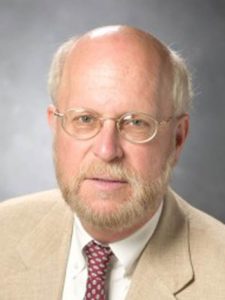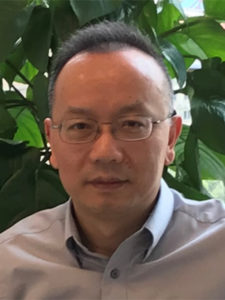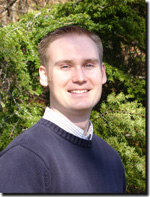Congratulations to Henry F. Schaefer III, Physical Chemistry Chemical Physics Associate Editor, Graham Perdue Professor of Chemistry and director of the Center for Computational Quantum Chemistry at the University of Georgia for winning the 2018 Charles H. Stone Award, presented every 2 years by the American Chemical Society Carolina-Piedmont Section to an outstanding chemist in the southeastern US. The award recognizes contributions to the field of chemistry through activities in the scientific community, public outreach, education, and research.
Archive for the ‘Board News’ Category
New PCCP Associate Editor, John Zhang
We are delighted to welcome John Zhang as our newest Physical Chemistry Chemical Physics Associate Editor.
John Zhang, New York University Shanghai
ORCiD 0000-0003-4612-1863
John Zhang is professor of chemistry at New York University Shanghai and Director of NYU-ECNU Center for Computational Chemistry at NYU Shanghai. His current research focuses on protein structure and dynamics, fragment quantum chemistry study of biomolecules, polarizable force field, protein-ligand interaction, protein-protein interaction, ab initio molecular dynamics study of biomolecules and computational drug design.
Submit your best work to John now.
Read John’s latest Papers in PCCP here:
BAR-based optimum adaptive sampling regime for variance minimization in alchemical transformation: the nonequilibrium stratification
Xiaohui Wang, Xingzhao Tu, John Z. H. Zhang and Zhaoxi Sun
Phys. Chem. Chem. Phys., 2018,20, 2009-2021. DOI: 10.1039/C7CP07573A
Direct folding simulation of helical proteins using an effective polarizable bond force field
Lili Duan, Phys. Chem. Chem. Phys., 2017,19, 15273-15284. DOI: 10.1039/C7CP02101A
Introducing PCCP’s new Editorial Board Chair David Rueda
David Rueda, Imperial College London, UK
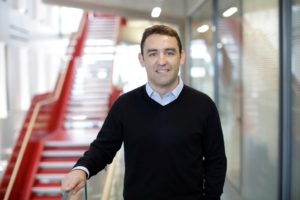
Having served on the Physical Chemistry Chemical Physics (PCCP) Editorial Board as Deputy Chair, David looks forward to his new role as Editorial Board Chair.
“It’s an honour to Chair the Editorial Board of Physical Chemistry Chemical Physics in 2019.
“In this new role, I look forward to assisting the Editorial Board to maintain the high-quality standards of our journal.”
Submit your best physical chemistry, chemical physics and biophysical chemistry research today.
David’s research involves the development of quantitative single-molecule approaches to investigate the interactions between proteins and nucleic acids to elucidate the mechanism of complex biochemical reactions.
Find out more about David here or read his recent PCCP article:
Paper
Reduced structural flexibility for an exonuclease deficient DNA polymerase III mutant
Hailey L. Gahlon, Alice R. Walker, G. Andrés Cisneros, Meindert H. Lamers and David S. Rueda
Phys. Chem. Chem. Phys., 2018, 20, 26892-26902. DOI: 10.1039/C8CP04112A
David has selected some of the most outstanding physical chemistry and chemical physics research from the past year to share with you. Read them now for free until the end of March 2019:
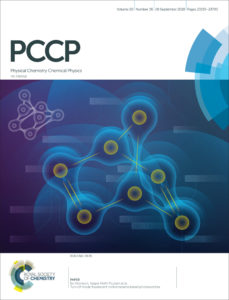
Paper
Consequences of Mg2+ binding on the geometry and stability of RNA base pairs
Antarip Halder, Rohit Roy, Dhananjay Bhattacharyya and Abhijit Mitra
Phys. Chem. Chem. Phys., 2018, 20, 21934-21948. DOI: 10.1039/C8CP03602K
Paper
Conformational changes of DNA induced by a trans-azobenzene derivative via non-covalent interactions
Hong Zhang, Haohao Fu, Xueguang Shao, Christophe Chipot, Antonio Monari, François Dehez and Wensheng Cai
Phys. Chem. Chem. Phys., 2018, 20, 22645-22651. DOI: 10.1039/C8CP03836H
Paper
Turn-off mode fluorescent norbornadiene-based photoswitches
Behabitu Ergette Tebikachew, Fredrik Edhborg, Nina Kann, Bo Albinsson and Kasper Moth-Poulsen
Phys. Chem. Chem. Phys., 2018, 20, 23195-23201. DOI: 10.1039/C8CP04329A
To keep up to date the latest physical chemistry and chemical physics research and other journal news, sign up to the e-alerts.
2018 PCCP Emerging Investigator Lectureship: awarded to Professor Debashree Ghosh
Nominations were open to all and were made by leading researchers from around the world. The nominee list was shortlisted by the Editorial Board prior to the Fall PCCP Editorial Board meeting, at which, Professor Debashree Ghosh (Indian Association for the Cultivation of Science) was selected as the 2018 recipient.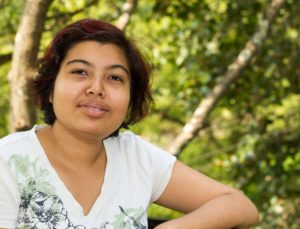
Professor Ghosh develops and applies accurate quantum chemical methods to understand the interaction between light and coupled bio-chromophores. Electronic structure theory gives us unique tools to understand the energy states of the chromophores and their coupling to each other and therefore, gives us a glimpse into their photochemistry and photo-dynamics.
As part of the Lectureship, Professor Ghosh will be awarded a travel bursary of £1000 to attend and present at a leading international event in 2019, where she will be presented her Lectureship award. Professor Ghosh has also been invited to contribute a Perspective article to PCCP.
Many congratulations to Professor Ghosh on behalf of the PCCP Ownership Societies and Editorial Board.
Nominations for the 2019 PCCP Emerging Investigator Lectureship will open next summer, keep up to date with latest journal news on the blog, Twitter, newsletter and e-TOC alerts.
Celebrating 20 years of society collaboration in physical chemistry and chemical physics
We are proud to announce that PCCP is holding a symposium at the 7th EuCheMS Chemistry Congress on Monday 27th August entitled: “Celebrating 20 years of society collaboration in physical chemistry and chemical physics”. Join us at this special one-day symposium to mark volume 20 of PCCP being published, which aims to celebrate and encourage collaboration between nations across the physical chemistry and chemical physics community.
This unique event will feature scientific talks from distinguished PCCP Editorial Board members and the recipient of the 2017 PCCP Emerging Investigator Lectureship, Professor Ryan Steele (University of Utah), covering a variety of topics that reflect journal’s broad scope. The symposium also includes a panel discussion, led by the Chair of the PCCP Ownership Board, Dr Lene Hviid (Shell) on the importance and value of collaboration in the physical chemistry community for the benefit of research and individual careers.
The symposium will be led by Professor Seong Keun Kim, the Chair of PCCP and Dr Katie Lim, PCCP Executive Editor.
Confirmed speakers include:
- Professor Kiyotaka Asakura (Institute for Catalysis, Hokkaido University)
“The sensitivity and resolution development of X-ray spectroscopy – smaller, faster, thinner and sparser samples” - Professor Piero Baglioni (University of Florence)
“Polymer hydrogel networks and complex fluid for the conservation of modern and contemporary art” - Professor Luis Bañares (Universidad Complutense de Madrid)
“Molecules under strong laser fields: Shaping ultrafast photodissociation dynamics and stereodynamics” - Professor Anna Krylov (University of Southern California)
“Collaboration between theory and experiment in physical chemistry and chemical physics: The whole is larger than the sum of the parts” - Dr Anouk Rijs (Radboud University)
“Peptide self-assembly; one non-covalent interaction at a time” - Professor David Rueda (Imperial College London)
“How Cas9 Finds Off-Targets” - Professor Henry Schaefer (University of Georgia)
“Some Chemistry Involving Hypervalent Iodine” - Professor Ryan Steele (The University of Utah)
“2017 PCCP Lectureship – From Electrons to Molecular Vibrations … and Back”
Join us at the the Arena and Convention Centre Liverpool (ACC Liverpool) on Monday, 27th August for this special event. For more information, see the Full Programme.
The European Association for Chemical and Molecular Sciences (EuCheMS) is holding its 7th Chemistry Congress in Liverpool, United Kingdom on 26th – 30th August 2018. The Congress is an internationally respected, large-scale event for the chemical sciences.
For more information about this exciting conference, please visit the conference web page.
Changes to PCCP Communication articles
PCCP Communications are urgent reports of highly original and significant work likely to have a high impact on the community and of such importance that rapid publication is justified.
We are making some changes to the format of PCCP Communications to ensure they are succinctly communicating the most urgent research.
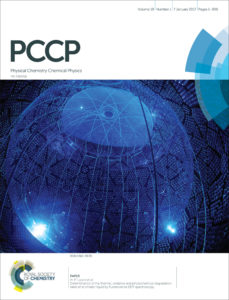
From 1st August 2018, all Communications articles submitted to PCCP must:
- Not exceed 4 printed journal pages
- Be submitted on a Communications template
- Include 4 or fewer figures including tables
- Be submitted with a short statement justifying why the work merits urgent publication as a Communication
PCCP Communications are:
- given priority treatment
- fast-tracked through the publication process
- appear prominently at the front of the journal in a dedicated Communications section ensuring rapid exposure
Submit your most urgent work as a Communication here now!
Open for Nominations: 2018 PCCP Emerging Investigator Lectureship
Lectureship details
 Recognizing and supporting the significant contribution of early career researchers in physical chemistry, chemical physics and biophysical chemistry, the lectureship is a platform for an early career physical chemist to showcase their research to the wider scientific community.
Recognizing and supporting the significant contribution of early career researchers in physical chemistry, chemical physics and biophysical chemistry, the lectureship is a platform for an early career physical chemist to showcase their research to the wider scientific community.
The recipient will receive £1000 to cover travel and accommodation costs to attend and present at a leading international meeting hosted by a PCCP Owner society. The recipient will also be invited to contribute a Perspective article to PCCP.
Launched with great success in 2016, previous winner’s include:
Dr David Glowacki, University of Bristol (2016 winner) and
Professor Ryan P. Steele, University of Utah (2017 winner).
Read a selection of their work in the PCCP Emerging Investigator Lectureship Themed Collection.
Eligibility
To be eligible for the lectureship, candidates must:
• Have completed their PhD
• Be actively pursuing an independent research career within physical chemistry, chemical physics or biophysical chemistry.
• Be at an early stage of their independent career (typically this will be within 10 years of completing their PhD, but appropriate consideration will be given to those who have taken a career break or followed a different study path).
Selection criteria, nomination and judging process
• Nominations must be made via email to pccp-rsc@rsc.org using the PCCP Emerging Investigator Lectureship nomination form and a letter of recommendation.
• Individuals cannot nominate themselves for consideration.
• Selection will be made by the PCCP Editorial Board at the 2018 PCCP Editorial Board meeting.
• The winner will be selected based on their nomination, with due consideration given to the letter of recommendation, candidate biography, research achievements, previous PCCP publications and overall publication history.
Submit a nomination
To be considered for the 2018 Lectureship, the following must be sent to the Editorial Office
• A letter of recommendation
• A complete nomination form
Submission deadline: 20th June 2018
2017 PCCP Emerging Investigator Lectureship: awarded to Professor Ryan P. Steele
Nominations were open to all and were made by leading researchers from around the world. The nominee list was shortlisted by the Editorial Board prior to the Fall 2017 PCCP Editorial Board meeting, at which, Professor Ryan P. Steele, University of Utah was selected as the 2017 recipient.
Professor Steele’s research focuses on in fundamental physical chemistry and problems in which unique electronic structure leads to interesting nuclear dynamics. He develops theoretical methods that efficiently interface accurate electronic structure theory with electronic and nuclear dynamics.
As part of the Lectureship, Professor Steele will be awarded a travel bursary of £1000 to attend and present at a leading international event in 2018, where he will be presented his Lectureship award. Professor Steele has also been invited to contribute a Perspective article to PCCP.
Many congratulations to Professor Steele on behalf of the PCCP Ownership Societies and Editorial Board.
Nominations for the 2018 PCCP Emerging Investigator Lectureship will open next summer. Keep up to date with latest journal news on the blog, Twitter, newsletter and e-TOC alerts.
New PCCP Associate Editor: Anna Krylov
We are delighted to welcome Anna Krylov as our newest Physical Chemistry Chemical Physics Associate Editor.
Anna Krylov, University of Southern California, USA
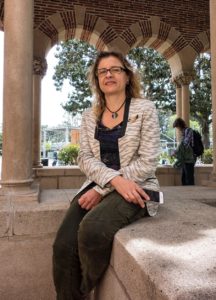 ORCiD orcid.org/0000-0001-6788-5016
ORCiD orcid.org/0000-0001-6788-5016
Anna Krylov is the Gabilan Distinguished Professor in Science and Engineering and a Professor of Chemistry at the University of Southern California working in the area of theoretical and computational quantum chemistry. Born in Donetsk, Ukraine, Krylov received her M.Sc. from Moscow State University and her Ph.D. from the Hebrew University of Jerusalem, where she worked on molecular dynamics in rare gas clusters and matrices under the supervision of Professor Benny Gerber. Upon completing her Ph.D., she joined the group of Prof. Martin Head-Gordon at the University of California, Berkeley as a postdoctoral research associate, where she became involved with electronic structure method development. In 1998, she joined the Department of Chemistry at USC.
Professor Krylov’s research is focused on theoretical modeling of open-shell and electronically excited species. She develops robust black-box methods to describe complicated multi-configurational wave functions in single-reference formalisms, such as coupled-cluster and equation-of-motion approaches. She developed the spin-flip approach, which extends coupled-cluster and density functional methods to diradicals, triradicals, and bond-breaking. Krylov also develops many-body theories for describing metastable electronic states (resonances) and tools for spectroscopy modeling (including non-linear optical properties). Using the tools of computational chemistry, and in collaboration with experimental laboratories, Krylov investigates the role that radicals and electronically excited species play in combustion, gas- and condensed-phase chemistry, solar energy, bioimaging, and ionization-induced processes in biology.
Professor Krylov’s research has been recognized by several awards including the Dirac medal from the World Association of Theoretical and Computational Chemists (WATOC), Theoretical Chemistry Award from the Physical Chemistry Division of the American Chemical Society, and Bessel Research Award from the Humboldt Foundation. She is a Fellow of the American Physical Society, the American Chemical Society, and the American Association for the Advancement of Science. Krylov is an elected member of the International Academy of Quantum Molecular Science and a Board Member of WATOC.
“I am delighted to serve the community as an Associate editor of PCCP. Since its inception, PCCP has been promoting high-quality rigorous research, by providing excellent peer-reviewed publication platform.”
As a PCCP Associate Editor, Anna will provide her expertise in the fields of:
- Theoretical studies and methods
- Kinetics, spectroscopy
- Energy storage/conversion
- Electrochemistry
New PCCP Advisory board members
PCCP are happy to anounce some new advisory board members starting in 2017.
- Denis Jacquemin, Université de Nantes, France
- Toshinori Suzuki, Kyoto University, Japan
- Paul Ayers, McMaster University, Canada
Check out our PCCP page for more details on our Editorial and Advisory board members.


